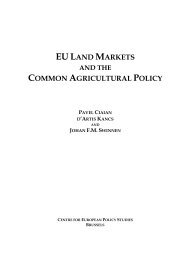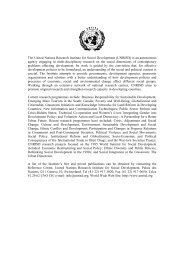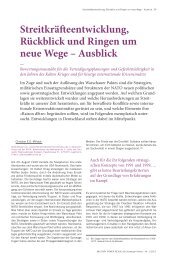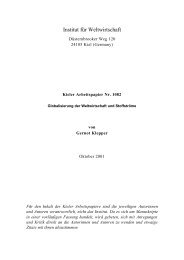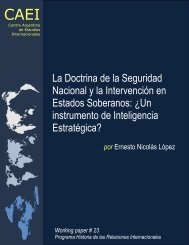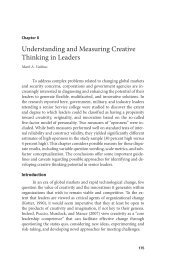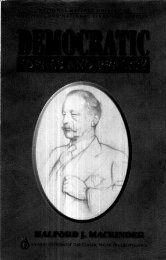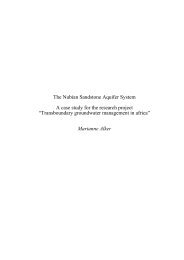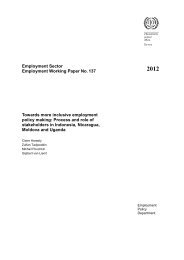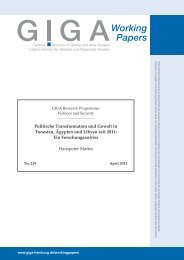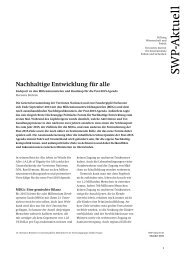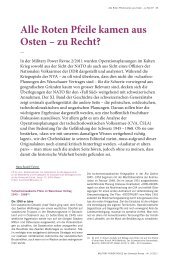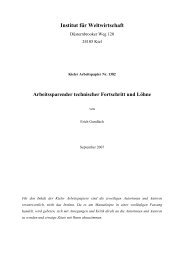A Postcolonial-Feminist Alternative to Neoliberal Self/Other Relations
A Postcolonial-Feminist Alternative to Neoliberal Self/Other Relations
A Postcolonial-Feminist Alternative to Neoliberal Self/Other Relations
Create successful ePaper yourself
Turn your PDF publications into a flip-book with our unique Google optimized e-Paper software.
Here, we find an opening for emancipa<strong>to</strong>ry politics. Relationality challenges<br />
hypermasculine whiteness – or any camp of hypermasculinity, for that matter – by<br />
producing an alternative method <strong>to</strong> politics in order <strong>to</strong> transform it. Towards this end,<br />
postcolonial-feminist relationality offers an orientation, a point of departure, by setting<br />
the usual analytical categories in<strong>to</strong> dynamic interaction, leading <strong>to</strong> open-ended, not fixed<br />
or known, outcomes (cf. Ling 2007).<br />
Take, for example, an older Muslim woman who has few skills outside the house.<br />
Those who emphasize market efficiency and productivity may consider her ‘poor’,<br />
‘helpless’, and ‘irrelevant’. But this same woman could be ‘well-off’ and ‘powerful’<br />
precisely due <strong>to</strong> her social position as the household’s mother and/or mother-in-law.<br />
Indeed, it is her role as a linkage between the marketplace and the household that offers<br />
possibilities for change and resistances <strong>to</strong> it. <strong>Postcolonial</strong> feminists recognize these<br />
multiple and contending subjectivities as alternative sources of power that envelope and<br />
puncture conventional notions of who’s in charge and why. The same applies <strong>to</strong><br />
contending cultural worlds.<br />
Moraga and Anzaldua (1983) called it being on the ‘borderlands’. For them,<br />
‘borderlands’ afflicts women of color especially. Not only do they ‘travel’ constantly inbetween<br />
say, an English-speaking world outside the home and a Spanish-speaking one<br />
inside, but they must also ‘translate’ or make sense of all the differences, contestations,<br />
and contradictions among these worlds especially for patriarchs and other authority<br />
figures who feel entitled <strong>to</strong> have ‘subordinates’ do the hard work for them. As metaphor<br />
and lament, Moraga and Anzaldua titled their volume, ‘This Bridge Called My Back’.<br />
I recognize these burdens. Much intellectual, emotional, and psychic labor has<br />
been put in<strong>to</strong> traveling and translating across worlds, none of it easy by any means (cf.<br />
Fanon 1965, 1967). But it is also this world-straddling labor, cumulated over the<br />
centuries, that gives postcolonials – especially postcolonial women – the benefits of being<br />
on the borderlands: i.e., a far superior inven<strong>to</strong>ry of seeing and acting in the world than<br />
what any singular worldview could provide. ’Tradition’, for example, becomes a<br />
reposi<strong>to</strong>ry of resources <strong>to</strong> draw on rather than a negative his<strong>to</strong>ry <strong>to</strong> overcome for<br />
‘modernity’. As we see below, pre-colonial encounters from the Silk Road can show us<br />
another model of inter-cultural negotiation. By no means does this suggest that life on<br />
15



